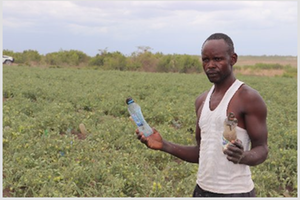Nairobi residents consuming contaminated eggs, report reveals

The sampled eggs were collected in Dandora and its environs, the largest dumpsites in Nairobi. The dumpsite is believed to have a bulk of uncollected plastic materials where they are subjected to open burning.
What you need to know:
- The bioindicator findings show that highly toxic chemicals from plastic waste are contaminating the food chain products.
- This therefore means that even animals that feed around dumpsites like Dandora produce contaminated milk and meat, raising alarm on the high level of contamination of foods in Nairobi.
If you live in Nairobi and eggs are a part of your diet, you are likely to be consuming contaminated eggs.
A report by the Centre for Environment Justice and Development (CEJAD), shows that a sample of free-range chicken eggs near dumpsites, e-waste, and plastic waste recycling yards contained extremely high levels of persistent organic pollutants (POPs).
POPs are dangerous organic compounds that are not biodegradable.
“These are chicken that scavenge in dumpsites or in areas where recycling is done. The report is an indication for that particular contaminated site. It means that people who physically live around dumpsite and areas where there is a lot of handling of e-waste are exposed to these chemicals, “Aaron Kecha, a technical advisor from CEJAD, told Climate Action.
The sampled eggs were collected in Dandora and its environs, the largest dumpsites in Nairobi. The dumpsite is believed to have a bulk of uncollected plastic materials where they are subjected to open burning. Environmental experts say that open burning of these plastic wastes releases furans and dioxins chemicals into the soil, air and water. In return, the free-range chicken feed on plants that grow in such environments and the eggs they lay have high POPs content.
“The eggs showed very high concentrations of POPs chemicals that are as much as 111 times higher than the EU regulatory limits for dioxins, plus dioxin-like PCBs and showed that an adult eating a single egg from one Kenyan location could be exposed to a dose of toxic chemicals that would exceed the EU daily safety limit for more than 250 days,” reads part of the CEJAD report.
The bio indicator findings show that highly toxic chemicals from plastic waste are contaminating the food chain products. This therefore means that even animals that feed around dumpsites like Dandora produce contaminated milk and meat, raising alarm on the high level of contamination of foods in Nairobi.
While the sample was collected from hotspot areas of plastic wastes, Kecha explained that not everybody who eats eggs laid by free-range chickens in Nairobi could be consuming contaminated eggs.
“We did biomonitoring which means that if you live in Dandora and you keep free-range chicken and they go into those contaminated sites, chances are that the eggs may have high loads of chemicals for that particular site but it does not mean that any other site may have the same result,” Kecha explained.
Plastic management has been a major challenge in most urban areas with most of its materials containing POPs used in electronics, vehicle parts, furniture, carpets and synthetic textiles. Scientists have associated the dangerous chemicals that plastic contain to be harmful to human health and are not safe for human consumption.
“It’s true that we like organic eggs which contain higher beta-carotene. We have to remember that hens get beta-carotene from the leaves of plants. The problem is that if your hens are feeding in contaminated places then they are likely to have eggs that are contaminated with POPs which are not good for our health,” says Dennis Otieno, a food scientist from the University of Nairobi.
Dr Otieno also terms Dandora dumpsite as the biggest health hazard for Nairobi residents, noting that since POPs are moved by air, everybody within Nairobi is exposed to many toxics. This, he says, happens mostly by inhaling medical wastes when they are burnt and go into the air.
“Open burning of wastes should be prohibited because most of the materials in Nairobi are inorganic and all of them are sources of POPs. Even cows that graze in Nairobi and go to Dandora dumpsite produce very risky meat and milk that should not be eaten,” warns Dr Otieno.
The report has been released ahead of the World Environment Day tomorrow.
CEJAD is pushing for measures to systematically eliminate and substitute hazardous chemicals like monomers, polymers and additives used in plastics to support a non-toxic circular economy. The public interest organisation, working to promote sound chemicals management and waste also wants transparency measures to understand the chemicals used in plastics. According to CEJAD, this will allow actors in the value chain to protect workers and consumers from potential risks and an efficient use of resources.





